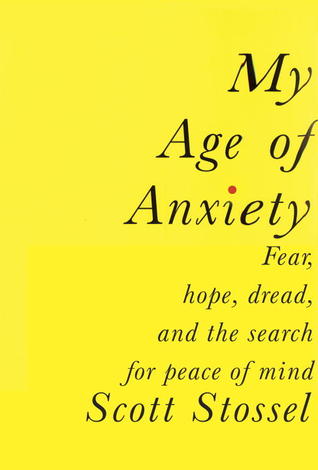I debated a while whether or not I should review this book on my blog. It's easy to find something to say about The Age of Anxiety - and revealing.
I have struggled with anxiety for years. As a child I was nervous frequently. It didn't change how I lived my life, but I felt uptight often. After graduating from college I experienced panic attacks for the first time. I did take medicine for a while, but then eventually got back into my exercise routine, and adjusted to being a grown-up with more demands and stress in my life.
For almost twenty years I was fine - even when my oldest daughter was in treatment for cancer. But within the past few years, my good friend anxiety has returned.
This book is part memoir, part science manual explaining how anxiety drugs are developed and which part of your body/brain they impact. I will admit I love the memoir part more than the science part (because some of that just goes right over my head). But, I am interested in this book for personal reasons, and enjoy hearing from Stossel about his own experiences with anxiety.
A few things I have to think about:
1. There may be a genetic component to anxiety, as Stossel has anxiety much like his mother, and his children appear to have anxiety issues that are developing as well.
2. Even up until the early to mid 1990s there was a social stigma attached to anxiety. Today anxiety is a common problem.
3. Anxiety may be related to sorrow (I already knew anxiety and depression were closely linked) and may be a way that sorrow/grieving that is not done reveals itself.
4. Stress can be transmitted from a mother to an unborn child, making the child more susceptible to suffer from anxiety later in life.
5. Anxiety must be something that is intrinsic - infants who have a quicker startle reflex or who are more anxious around strangers suffer from anxiety later in life at a higher rate.
This book is definitely worth reading, especially if you are someone who has experience in dealing with anxiety on a personal level.
Stossel's book gave me a few things to think about and reflect on. I am sure I could re-read it and take notes, but having read it in small spurts while running on the treadmill (not the best way to read a book that is very dense with facts) I feel like I have some new ideas about anxiety and also feel like I am not alone in dealing with this problem.

1 comment:
This sounds like an awesome book! I will definitely be adding it to my list. I got my degree in psychology, so I know a bit about the correlation between anxiety/depression. And I think that there is definitely a genetic component that comes into play. Sounds very interesting (although I have to admit...I tend to skim the research-heavy portions of books like these!)...thanks for sharing!
Post a Comment